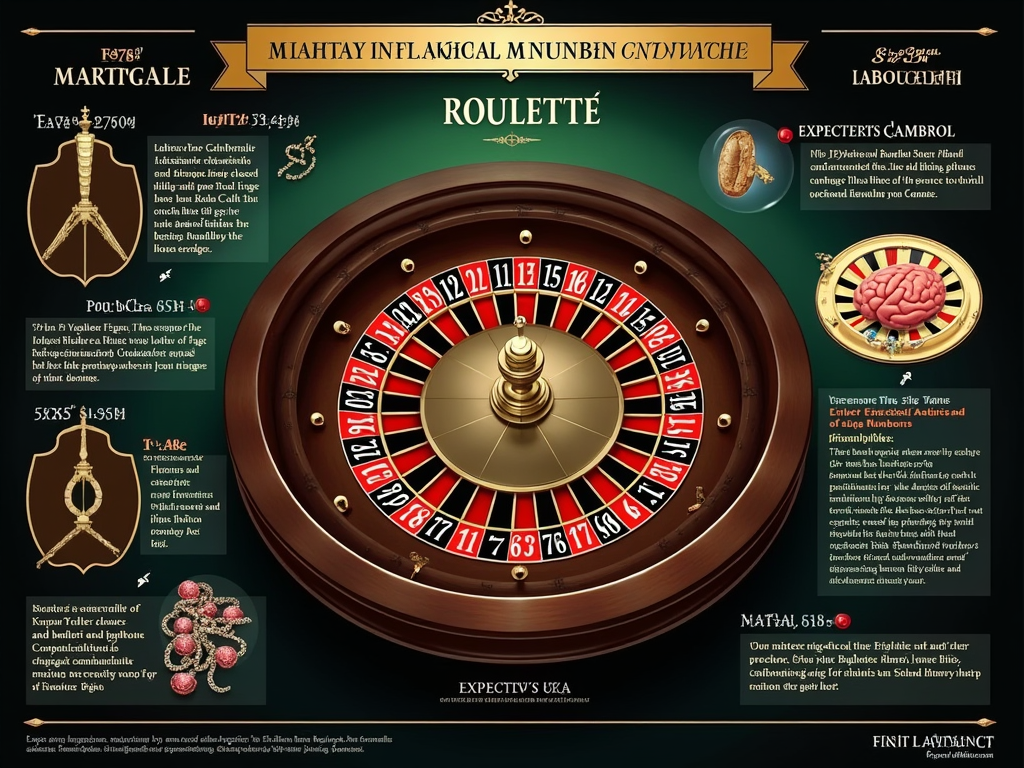Roulette Betting Systems: Myths vs. Mathematical Reality
Roulette betting systems remain popular with players seeking an edge against the casino. However, mathematical proof shows that these methods can’t beat the fixed house advantage of 2.70% in European Roulette and 5.26% in American Roulette. Through detailed analysis and computer simulations, I’ve confirmed that no betting pattern alters these fundamental odds.
Key Takeaways
- Each roulette spin stands alone, with no connection to past results or betting sequences
- The house edge stays fixed no matter which betting system is used, making sustained profits mathematically impossible
- Systems like Martingale and Fibonacci break down due to table limits and the risk of severe losing streaks
- Betting systems are best used as bankroll management tools rather than as profit generators
- Short-term wins may occur, but the casino’s mathematical advantage prevails over time
The Independent Nature of Roulette Spins
The basic truth persists—the casino’s statistical advantage operates independently of any betting method. Many players misunderstand this reality, chasing patterns that seem logical but cannot change the core mathematics of the game. Testing reveals that even carefully structured betting progressions face the same house edge as random wagers.
The Limits of Betting Systems
My research into various systems highlights their limitations. For instance, table maximums prevent players from endlessly doubling bets in the Martingale system. The Fibonacci sequence poses similar problems, leading to substantial losses during losing streaks.
While these approaches can add structure to your betting decisions, they don’t increase your odds of winning. The belief that systemized betting may overcome probability falters under mathematical scrutiny.
A Realistic Approach to Roulette Betting
The casino’s edge remains constant and unbeatable through betting systems alone. I recommend viewing these methods as ways to manage your gambling funds rather than as strategies for long-term profit. This realistic perspective helps maintain control while still enjoying the excitement of roulette.
Ultimately, enjoying roulette responsibly means understanding and accepting the mathematical boundaries of the game. Betting systems may offer structure and entertainment, but they can’t defy the odds that favor the house.
The House Edge: Why Roulette Cannot Be Beaten
Let’s cut through the myths and get straight to the facts about casino advantage in roulette betting and strategy. The house edge in European Roulette sits at 2.70%, while American Roulette carries a steeper 5.26% edge. This difference might seem small, but it significantly impacts your chances of winning.
Understanding Independent Events
Each roulette spin exists in its own moment — completely separate from what happened before. I’ve seen countless players fall into the trap of thinking previous results matter, but they don’t. It’s just like flipping a coin — getting heads five times in a row doesn’t make tails any more likely on the next flip.
The Math Behind the House Edge
The casino’s advantage is built right into the game’s structure through precise mathematical calculations. Here’s what makes it unbeatable:
- The payout rates don’t match the true odds of winning
- The presence of green zero (and double zero in American Roulette) tilts the odds in the casino’s favor
- The Expected Value (EV) is negative for every possible bet
- Long-term probability always favors the house
Think of it this way: if you’re playing European Roulette, for every $100 you bet, the casino expects to keep $2.70 over time. This isn’t just a theory — it’s mathematical certainty. The longer you play, the more likely your results will align with these percentages.
The independence of each spin means that patterns players think they spot are just illusions. I’ve studied thousands of spins, and the results consistently prove that no strategy can overcome the built-in house advantage. Even the most sophisticated betting systems can’t change the fundamental mathematics that power the game.
Simply put, casinos don’t need to cheat — they’ve already got a guaranteed profit built into every spin. That’s why I always recommend treating roulette as entertainment rather than a way to make money. Understanding these mathematical principles helps you make smarter decisions about your gambling approach.
Popular Betting Systems and Their Fatal Flaws
Common Progressive Betting Systems
I’ve analyzed countless betting systems that claim to beat roulette’s house edge through strategic wagering, but each has serious drawbacks that players need to understand.
The Martingale system is likely the most well-known approach. It calls for doubling your bet after every loss, aiming to recoup previous losses plus a small profit when you eventually win. While this sounds good in theory, it crashes into two major obstacles: table betting limits and your bankroll size. Just 6 consecutive losses would require your next bet to be 64 times your initial wager – a risky proposition that could quickly deplete your funds.
The Reverse Martingale (Paroli) takes the opposite approach by doubling bets after wins. Though this limits potential losses, a single loss can wipe out all accumulated gains, making it just as flawed as its counterpart.
For a more measured approach, some players turn to the D’Alembert system. This method increases bets by one unit after losses and decreases by one after wins. While gentler on your bankroll than the Martingale, it still leads to steady losses over time since the house edge remains unchanged.
Complex Betting Sequences
The Fibonacci system follows the famous number sequence where each number is the sum of the previous two. Players increase their bet size according to this sequence after losses and move back two numbers after wins. However, like other systems, it can’t overcome extended losing streaks.
The Labouchère system requires players to write down a sequence of numbers, with your bet being the sum of the first and last numbers. After a win, these numbers are crossed off; after a loss, the lost amount is added to the end. This complex tracking makes it hard to maintain during fast-paced play.
The James Bond strategy takes a fixed amount, typically $200, and splits it across specific bets: $140 on high numbers (19–36), $50 on middle numbers (13–18), and $10 on zero. Despite its sophistication, this approach still faces the same negative expected value as simpler betting patterns.
Here are the key issues that plague all betting systems:
- Table limits prevent infinite progression of bet sizes
- Extended losing streaks can quickly exhaust your bankroll
- No system can alter the fundamental house edge
- Tracking requirements can lead to costly mistakes
- Higher bet sizes amplify losses during downswings
While these systems might provide structure to your betting, none can guarantee long-term profits. The math behind roulette remains constant – each spin is independent, and the house maintains its advantage regardless of your betting pattern.
The Mathematical Reality Behind Betting Strategies
Let’s cut through the myths and examine the cold, hard math behind roulette betting strategies. Every spin of the wheel carries a negative Expected Value (EV), meaning you’ll lose money in the long run, regardless of your betting system.
Understanding the Numbers
I can tell you with certainty that betting strategies don’t change your odds of winning at roulette in the long term. They might make your playing experience feel more structured, but they can’t overcome the built-in house advantage.
Here’s what makes betting systems ineffective:
- The Law of Large Numbers shows that the more you play, the closer your results will match the expected mathematical probability
- Each spin is an independent event – previous results don’t influence future outcomes
- Progressive betting systems only change when you win or lose, not the likelihood of either happening
- The house edge remains constant regardless of bet size or pattern
Think of it like this: if you’re playing European roulette with a 2.7% house edge, that percentage stays fixed whether you’re using the Martingale system, D’Alembert, or just betting randomly. No amount of clever bet sizing can eliminate this mathematical disadvantage.
Short-term variance might give the illusion that a system is working. You might hit a lucky streak and double your money, or use a progression strategy that seems to recover losses. But these temporary swings mask the underlying mathematical reality – the casino’s edge will prevail over time.
The beauty of probability theory lies in its predictability. While individual results can vary wildly, the averages over thousands of spins will align remarkably close to the expected mathematical outcomes. This mathematical certainty is what keeps casinos profitable and makes consistent winning impossible through betting strategies alone.
Instead of chasing the perfect system, I recommend setting strict limits on your playing time and bankroll. This approach won’t boost your odds of winning, but it will help you manage your gambling experience more effectively.

Why Players Fall for Betting Systems
Betting systems in roulette often attract players with their promise of guaranteed wins, but understanding why these systems hold such appeal reveals fascinating insights into human psychology. The magnetic pull of betting systems stems from deeply rooted cognitive biases that shape how players perceive chance and probability.
The Psychology Behind System Betting
The Gambler’s Fallacy stands out as one of the most powerful misconceptions affecting roulette players. I’ve seen countless players convinced that after five red numbers, black must be “due” to appear. This common mistake leads to costly betting decisions based on the false belief that independent spins somehow influence each other.
The Illusion of Control tricks players into thinking they can outsmart the game through careful observation and strategic betting. Players often believe their system gives them an edge, despite roulette being purely random. This false sense of control can lead to increased betting and potential losses.
Here’s how cognitive biases impact roulette players:
- Confirmation Bias: Players selectively remember their wins while dismissing or forgetting their losses, creating an inaccurate picture of their success rate.
- Pattern Recognition: The human brain naturally seeks patterns, even in completely random events like roulette spins.
- Short-term Thinking: Quick winning streaks can create a false sense of system effectiveness, overlooking longer-term statistical realities.
- Selective Memory: Players tend to share stories of their wins while keeping quiet about their losses, creating a skewed perception of success rates.
The appeal of betting systems gets stronger when players experience early success. A few winning sessions can convince someone their system works, even though these results simply reflect normal short-term variance. This initial success often prompts players to increase their bets, making eventual losses more significant.
I find that players who understand these psychological traps are better equipped to make rational decisions at the roulette table. By recognizing these cognitive biases, you can avoid the common pitfall of believing in systems that claim to beat a mathematically unbeatable game.
The Only Valid Use for Betting Systems
Benefits of Structured Betting
I’ve found that betting systems serve a practical purpose beyond their marketed promise of beating the house. While they can’t overcome the mathematical house edge in roulette gameplay and betting patterns, they’re valuable tools for creating structure and discipline in your gambling sessions.
The real strength of betting systems lies in their ability to manage your bankroll effectively. By following a predetermined betting pattern, you’ll avoid making impulsive decisions that often lead to larger losses. These systems act as a personal framework, helping you stick to your betting limits and maintain control over your gambling experience.
Practical Implementation
Here’s how betting systems can enhance your roulette experience:
- They create clear entry and exit points for your gaming session
- They help distribute your bankroll across multiple bets
- They prevent emotional betting after losses
- They establish consistent bet sizing rules
- They provide a systematic approach to tracking wins and losses
I’ve noticed that players who use betting systems as bankroll management tools rather than profit-generating strategies tend to have more enjoyable and controlled gaming sessions. The key is understanding that these systems don’t increase your chances of winning — they simply help you play more responsibly.
Your betting system should align with your gambling budget and risk tolerance. For example, if you start with $100, your system might limit individual bets to $5 or less, ensuring you can place at least 20 bets before exhausting your bankroll. This approach helps extend your playing time and maximizes entertainment value.
Remember that even with a structured betting system, roulette remains a game of chance. The true value of these systems isn’t in beating the odds but in creating a disciplined approach to gambling that keeps the focus on entertainment rather than profit. By setting clear limits and sticking to them, you’ll maintain better control over your gambling activities while still enjoying the excitement of the game.

Experts and Evidence Against Betting Systems
Mathematical Analysis and Expert Views
I can tell you with certainty that betting systems in roulette don’t work – and I’m not alone in this assessment. Leading mathematicians and gambling analysts have repeatedly proven that no betting pattern can overcome the built-in house edge in roulette games or casino betting systems.
The math behind this is clear: each spin of the roulette wheel represents an independent event. What happened on previous spins has zero impact on future outcomes. This fundamental principle of probability means that no pattern of bets can gain an advantage over the house edge that’s built into the game.
Scientific Evidence and Simulations
Computer simulations have put betting systems to the test thousands of times, and the results are consistent: all systems eventually lose to the house edge. While you might see short-term wins, these are simply random variations in luck rather than proof that a system works.
Here’s what the evidence shows about popular betting systems:
- Progressive betting systems like Martingale lead to larger losses over time
- Pattern tracking systems fail because spins are truly random
- Betting combinations don’t change the underlying house advantage
- Systems based on “hot” or “cold” numbers ignore statistical independence
- Money management strategies can’t overcome negative expected value
The math is straightforward – with European roulette’s 2.7% house edge and American roulette’s 5.26% edge, every betting system will eventually lose money. This isn’t just theory – it’s backed by millions of documented spins and extensive statistical analysis.
Short-term wins using betting systems create an illusion of effectiveness. I’ve seen players hit winning streaks and credit their betting system, but these temporary successes are simply good fortune rather than proof of a working strategy. The longer you play, the more certain it becomes that the house edge will prevail against any betting pattern.
Modern casinos actually encourage belief in betting systems because they know the math is on their side. They’re happy to let players try different strategies since none can overcome the fundamental advantage built into the game’s structure.
Sources:
www.wizardofodds.com
www.pagat.com
Finding the Edge: Mathematical Analysis of Casino Games
JSTOR gambling probability papers





